|
|
|
Sort Order |
|
|
|
Items / Page
|
|
|
|
|
|
|
| Srl | Item |
| 1 |
ID:
174730
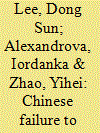

|
|
|
|
|
| Summary/Abstract |
This article explains China’s abortive attempt to stop North Korean nuclear development between 1993 and 2016. It attributes this failure to two international conditions. The first is geographical contiguity. As an adjacent great power, China had limited leverage over North Korea. Beijing’s threats of sanctions lacked credibility, as sanctions could trigger dangerous local instabilities. Its security inducements implied a risk of subordination, which Pyongyang was unwilling to accept. The second is the unipolar international system. Unipolarity curbed Beijing’s ability to protect Pyongyang from the United States, while simultaneously inducing China to pass the buck of restraining North Korea to the American unipole. This article corroborates these main arguments by drawing upon primary and secondary sources in Korean, Chinese, and English.
|
|
|
|
|
|
|
|
|
|
|
|
|
|
|
|
| 2 |
ID:
174728
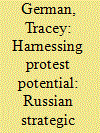

|
|
|
|
|
| Summary/Abstract |
The perceived threat posed to Russia from so-called colored revolutions–popular uprisings attributed by Moscow to malign sponsorship by external forces–has become a central theme in Russian security discourse. This article analyses how colored revolutions came to be characterized as a specific threat to national security and how they continue to shape Russian thinking about the changing character of conflict. It explores Russian perceptions of the threat from colored revolutions, using the concept of strategic culture as a framework to analyze these perceptions through an analysis of the Russian military theoretical literature and strategic documents. The article establishes that concerns about non-military means of destabilization reflect continuities in Russian strategic assumptions about adversaries and how they seek to achieve their national objectives. It also reveals the perpetuation of specific narratives about the country’s vulnerability to foreign interference.
|
|
|
|
|
|
|
|
|
|
|
|
|
|
|
|
| 3 |
ID:
174732
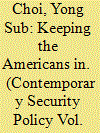

|
|
|
|
|
| Summary/Abstract |
Seoul and Washington have conceded that Terminal High Altitude Area Defense (THAAD) in South Korea cannot protect the capital region of Republic of Korea (ROK), including Seoul and Incheon, from North Korea’s missile attacks. Why did the South Korean government decide to deploy THAAD, risking possible retaliation from China, although it already knew its limited utility on the Korean peninsula? This article addresses the puzzle by connecting the deployment of THAAD in South Korea with the U.S. conception of a strategic rebalancing to Asia. By linking South Korea’s decision to deploy THAAD with contemporary alliance politics, extended deterrence, and abandonment and entrapment risks, it argues that Seoul’s THAAD decision was primarily intended to sustain and strengthen the U.S.-ROK alliance amid escalating nuclear threats by North Korea and deepening Sino-American rivalry.
|
|
|
|
|
|
|
|
|
|
|
|
|
|
|
|
| 4 |
ID:
174731
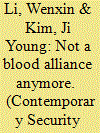

|
|
|
|
|
| Summary/Abstract |
What has driven China’s policy toward United Nations (UN) sanctions on North Korea? While insisting on a peaceful settlement of North Korean nuclear issues via diplomatic dialogues, China has gradually loosened its protective stance regarding UN sanctions on North Korea. This article examines the factors that have pushed China to take a tougher position toward North Korea: North Korea’s increasingly aggressive nuclear policy, the influence of the United States on Chinese foreign policy, and the changing perception of North Korea in China. Through close examination of China’s domestic discussions on North Korea, this article concludes that, besides the external factors, a growing negative perception of North Korea has played an increasingly important role in changing China’s official stance. The findings suggest that closer attention should be paid to the changes in the domestic political environment of China to understand its current and future approach toward North Korea.
|
|
|
|
|
|
|
|
|
|
|
|
|
|
|
|
| 5 |
ID:
174729
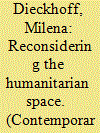

|
|
|
|
|
| Summary/Abstract |
Humanitarian agencies working in violent conflicts often insist on separating humanitarian negotiations from political mediation efforts. However, many academics and practitioners also wonder if humanitarian negotiations can really be apolitical and disentangled from peace negotiations. Using the case study of Syria, this article analyzes the interactions between humanitarian negotiations and international peace negotiations. By considering various actors involved in Syria and the different arenas of negotiations (mainly the Astana talks and the United Nations negotiations led by the Special Envoy), it demonstrates that humanitarian and peace negotiations are governed by a complex interdependence. A dual process of politicization of humanitarian action and “humanitarization” of political negotiations is at work, in a Syrian context characterized by a fragmented and controversial humanitarian space. This article is based on unique data from participant observation during four international meetings bringing together humanitarian practitioners from different organizations and political actors.
|
|
|
|
|
|
|
|
|
|
|
|
|
|
|
|
| 6 |
ID:
174727
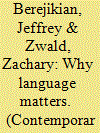

|
|
|
|
|
| Summary/Abstract |
Despite the obvious the risks involved in deterrence bargaining, we know surprisingly little about how the public evaluates risk during a crisis. A limited deterrence scholarship considers domestic preferences and tends to assume that the public’s risk tolerance remains stable throughout a deterrence episode. Yet, robust findings in cognitive psychology suggest that people’s risk tolerance can shift dramatically based on how the potential outcomes of military options are framed. We evaluate these competing views through a series of decision experiments grounded in prospect theory. Across an array of potential extended deterrence scenarios, we demonstrate that simply reframing the language used to describe the possible outcome of military options affects both the public’s willingness to accept risks and, therefore, their willingness to escalate the crisis. These findings condition long-standing concerns about the public’s intransigent risk disposition, which underpin research on costly signaling, deterrence traps, and nuclear self-deterrence.
|
|
|
|
|
|
|
|
|
|
|
|
|
|
|
|
|
|
|
|
|